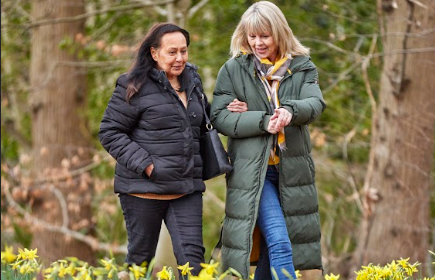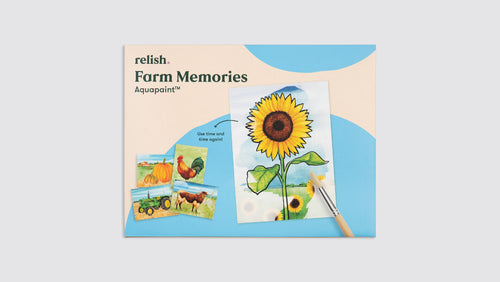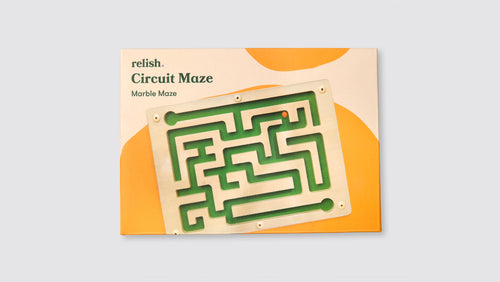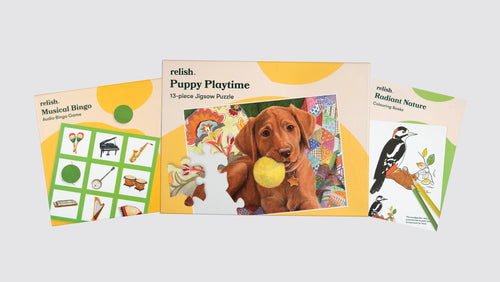Staying active and engaged can make a big difference to how we feel physically, mentally and socially. Whether you're looking for new ways to pass the time, reconnect with others or simply try something different, this list of ideas offers practical inspiration to help you bring more enjoyment into your day.
Jump straight to the activities you are looking for:
- Physical Activities
- Creative Activities
- Gardening Activities
- Learning Activities
- Volunteering Activities
- Cultural Activities
- Wellbeing Activities
- Games & Mental Challenges
- Group Activities
Physical Activities
Stay active and energised with simple exercises and gentle movement. Whether it's gentle seated exercises, dancing or walking outdoors, these activities support balance, strength, flexibility and overall health and wellbeing. Many can be tailored to different ability levels, ensuring everyone can join in.

Participating in at least two hours of moderate-intensity aerobics spread over five to seven days a week has excellent health benefits for all. And this doesn’t change as we get older.
Here are our top picks for staying active:
Strength training activities
Strength training isn't just the realm of young athletes. The physical benefits of incorporating regular strength training into your routine are protecting bone health, maintaining muscle mass and improving overall quality of life.
Initially, your exercise routine should focus on using your body weight. Then, when you're ready to add an extra challenge, you can use light weights.
1. Squats
This exercise works the thighs and glutes.
- Use a sturdy chair for support.
- Stand in front of it with feet hip-width apart.
- Lower your body as if you're about to sit.
- Then, push through your heels to stand up.
2. Incline pushups
This targets the chest and arms.
- Instead of the floor, use a wall or a sturdy table.
- Stand a few feet away.
- Place your hands on the surface and push yourself away.
3. Seated rowing
Carried out in a seated position, this exercise helps strengthen the back muscles.
- Wrap a resistance band around a steady post or under your feet.
- Pull the band towards you while squeezing your shoulder blades together.
4. Stationary lunges
This challenges the legs and core.
- Hold onto a support.
- Take a step forward and bend both knees to 90 degrees.
- Then, push back to the starting position.
Safety is key. It's essential to start slow and gradually increase intensity.
Here are a few guidelines:
- Before starting any exercise routine, it's crucial to consult with a healthcare professional, especially if there are pre-existing.
- Incorrect form can lead to injuries. Consider hiring a personal trainer or attending group exercise classes tailored for seniors to learn the basics.
- If something feels off or painful (beyond regular muscle soreness), it's essential to stop and re-evaluate.
Aerobic exercises suitable for seniors
Aerobic exercises, often termed as ‘cardio’, involve routines that increase heart rate and breathing, offering numerous health benefits, especially for older adults.
5. Walking
Simple yet effective aerobic exercise. Morning walks in a park or evening strolls in the neighbourhood can do wonders, as well as getting you some essential vitamin D. Consider joining a local walking group if you prefer walking with others.
6. Cycling
Stationary bikes or leisurely rides in a park can be both fun and beneficial. An ergonomically fitted bicycle will help prevent strains.
7. Nature hiking
For the more adventurous, gentle hikes in nature can be invigorating. Combining fresh air, nature's beauty, and physical activity can be incredibly therapeutic.
Engaging in aerobic exercises safely is paramount, especially for seniors. Here are a few considerations to bear in mind for safety:
- Especially if one is new to exercise or returning after a long period, it’s essential to begin at a comfortable pace and gradually increase intensity.
- Drink water before, during, and after exercise to prevent dehydration.
- Comfortable shoes with good grip and support and breathable clothing can make a world of difference.
- Fitness trackers or smartwatches can help monitor heart rate and ensure it stays within a safe range.
Activities to promote balance
While balance might seem like a basic skill, maintaining it becomes crucial for safety and overall wellbeing as we age. Engaging in balance exercises not only helps prevent falls but can also boost confidence in daily life.
Before you begin, ensure the area is free from obstacles and make sure there is a sturdy chair or railing nearby that can provide support when needed.
8. Standing on one foot
- Hold onto a sturdy chair.
- Lift one foot off the ground.
- Hold the position as long as you are comfortable.
- Switch feet and repeat.
Over time, try doing this without holding onto the chair.
9. Walking heel-to-toe
This exercise mimics a tightrope walk but on solid ground.
- Imagine you’re walking in a straight line (or a tightrope, if that helps!)
- Place one foot in front of the other so that the heel of one foot touches the toes of the other.
10. Tai Chi
This ancient Chinese martial art is both meditative and functional. Its flowing movements are excellent for improving balance, coordination and flexibility.
11. Yoga
Specific yoga poses, like the Tree Pose or Warrior Pose, challenge and enhance balance. Try joining a senior-specific yoga class, where you can access guidance and also socialise with others.
12. Pilates
While Pilates primarily focuses on core strength, many of its exercises also improve balance and coordination. Opt for classes or tutorials specifically tailored for seniors.
Balance exercises are generally low impact, but it’s essential to prioritise safety. Ensure the area is free from obstacles and make sure there is a sturdy chair or railing nearby that can provide support when needed.
13. Dance around the living room to your favourite song
Put on your favourite song and dance freely at home. You’ll soon feel uplifted, energised, and in a good mood! Our simple music player for seniors – Relish Radio – is a great product for easily listening to your favourite music.
Exercises to promote flexibility
As we age, our muscles and tendons naturally lose their elasticity, which can lead to stiffness, restricted movement, and an increased risk of muscle strains or joint pain. For seniors, maintaining and enhancing flexibility is key to ensuring a high quality of life, independence, and comfort.
Before you begin, make sure to warm up by walking or gently marching on the spot for a few minutes.
13. Neck and shoulder stretches
Gently tilting the head from side to side or doing slow neck rotations can alleviate tension in these areas. Shrugging and releasing the shoulders can also be beneficial.
14. Calf stretches
Using a wall for support, press the ball of the foot against it while keeping the heel on the ground. This stretches the calf muscles effectively.
15. Quadricep stretch
- Hold onto a chair for balance.
- Gently grasp one ankle and pull it towards your buttocks.
- Feel the stretch in the front of the thigh.
Top Tip: Listen to your body. Stretch to the point of tension, not pain. If a stretch hurts, it's a signal to ease up.
Activities for eye-hand coordination
Maintaining and improving eye-hand coordination contributes to overall cognitive health and daily functionality. These activities promote mental sharpness and help with tasks like cooking, picking up objects, and navigating surroundings confidently.
17. Racquet sports
Playing racquet sports such as tennis, badminton, and table tennis demands split-second decision-making and precise ball-handling. Engaging in these games may refine eye-hand coordination and enhance cognitive agility.
18. Swimming
Swimming is a full-body exercise that necessitates synchronised movements of limbs and breath control. The rhythmic nature of swimming supports eye-hand coordination, balance, and muscle strength. The buoyancy of water reduces the impact on joints, making swimming a gentle yet effective way to maintain physical fitness for older adults.
19. Non-contact boxing
Non-contact boxing involves shadowboxing and punching movements without actual physical contact. The combination of hand-eye coordination and footwork in boxing routines can significantly enhance cognitive and physical skills.
20. Playing catch with a ball
Simple yet effective, playing catch with a ball involves tracking the ball's trajectory and timing catches. This activity can be tailored to various skill levels and physical abilities.
For those looking for senior-specific guided exercises, SilverSneakers is a popular YouTube channel.
Loved ones with dementia may enjoy participating in our free dementia-friendly activities to encourage movement. Simply sign up for free access:
- Choose & Move
- Don’t drop that ball
- Chair dancing
- Buckets and bean bags
- Cruising down the river
- Musical mimicry
- Just strolling along
- The glorious outdoors
- Egg toss
- Chopstick race activity
Creative Activities
Creative activities hold the power to uplift spirits, provide a sense of accomplishment and let creative juices flow. For older adults, engaging in arts and crafts isn't merely about creating beautiful pieces – it's a means of expressing oneself, combating feelings of isolation, and regaining a sense of purpose.
Crafting is often a social activity that transcends generations. Elderly adults can engage in crafting sessions with family members, grandchildren or fellow residents in a communal setting. These shared moments foster connections and create lasting memories.
21. Sewing or knitting
Sewing and knitting offer a soothing, creative outlet. From knitted scarves to handmade cushions and patchwork quilts, it’s a wonderful way of creating something from scratch.
A loved one with dementia who used to love sewing or knitting may enjoy these reminiscing and sensory activities. Simply sign up to gain free access to all our activities.
22. Painting
Painting offers a dynamic outlet for self-expression. Explore a world of colours and textures and translate emotions and experiences onto canvas. This creative process can help ignite the imagination, enabling the communication of thoughts and feelings that words may struggle to convey. Seniors with dementia may enjoy our Aquapaints products or our free Paint a Masterpiece activity.
23. Colouring
Colouring can be a fun activity to enjoy with children or simply alone. Engaging in intricate designs and selecting colours promotes focus and mindfulness. It's a gentle way to soothe the mind, reduce stress, and create a sense of tranquillity. Our dementia-friendly colouring books are ideal for a simple but fun activity.
Explore our full range of painting and colouring books for people with dementia here.

24. Making jewellery
Designing and crafting jewellery isn't solely about aesthetics. It's about crafting wearable memories. Create pieces that hold personal significance, such as a bracelet adorned with charms representing cherished moments or a necklace that represents your unique style.
25. Pottery
The tactile nature of moulding clay engages the senses and fosters a deep connection between your hands and the creative process. Crafting functional pieces or decorative sculptures encourages a sense of accomplishment and invites exploration.
26. Writing poetry or short stories
Writing is a powerful mode of self-expression. Pen down your life experiences, memories, or fictional tales. Journaling offers a space for reflection, allowing you to capture thoughts and emotions.
Loved ones with dementia who enjoy literature may appreciate these free read-and-write dementia-friendly activities. Simply sign up to gain free access to all activities:
- Poetry Corner
- Read to Me: Poetry
- Poetry Quiz
- Autumn Poetry
- Read to Me: Stories
- Book Lovers' Quiz
- Tell Me a Story
-
For the Love of Books
27. Bake bread, pastries or cookies
Baking from scratch can be therapeutic and rewarding. Plus, there's a delicious treat to enjoy at the end!
Stuck for ideas on what to bake? Check out our free baking ideas. Simply sign up for free access:
- Tasty Madeleines
- Fabulous Fairy Cakes
- Yorkshire Parkin
- Jamaican Bulla Cake
- Irresistible Apple Turnovers
- Sumptuous Shortbread
-
Pumpkin Chip Cookies
Top tip: Make cooking tasks safer and easier by investing in ergonomically designed utensils and non-slip mats.
We have produced a range of dementia arts and crafts products specifically designed to be accessible to people with dementia, regardless of artistic experience.
Gardening Activities
Enjoy the calm and satisfaction of nurturing plants and spending time outdoors. Gardening is a therapeutic way to connect with nature and find purpose in small, seasonal changes.
Gardening doesn't need much physical strength. So, you can do basic tasks such as raking and watering or tending to flowers and herbs and still gain a wonderful sense of accomplishment.
Why not try one of the following:
28. Plant seeds and watch them grow
Planting seeds invites quiet reflection and gentle anticipation. As shoots emerge and grow, they offer a calming, rewarding sense of care, patience, and connection to the rhythm of nature.
29. Dig, plant, water and prune
The repetitive motions of digging, planting, and pruning provide both focus and freedom. These simple tasks engage the body and mind, grounding you in the present through purposeful, tactile activity.
30. Enjoy the scent and textures of the garden
Gardens awaken the senses – crisp leaves under hand, the scent of herbs, the softness of petals. These rich, layered sensations can soothe anxiety and gently reconnect you with your surroundings.
31. Tend to raised beds or containers
Raised beds and containers offer accessible gardening with all the joy and ritual of a larger space. They’re perfect for daily check-ins, seasonal planting, and moments of mindful tending.
32. Harvest vegetables and fruits, or pick flowers
Harvesting is a small celebration – plucking ripe tomatoes, clipping flowers for a vase. It brings a quiet sense of accomplishment and deepens one's appreciation for what has been nurtured over time.
For a loved one with dementia who loves gardening, why not try out these free dementia-friendly garden activities we’ve created? Simply sign up for free access:
Alternatively, this Garden Wonders Aquapaint is a great enrichment activity for someone in the mid-late stages of dementia.
Learning activities
It’s never too late to learn something new. These activities invite curiosity and discovery, whether through an online course, a local class, or simply rediscovering the joy of reading. Learning can be a gateway to intellectual stimulation, personal growth and expanding your horizons.
33. Take a local course or night class
Community colleges and adult education centres offer a chance to learn in a friendly, relaxed setting. Whether it’s cooking, photography or local history, joining a class can be a chance to discover something new as well as meet new people.
34. Sign up for an online course
Online platforms, such as Udemy or Coursera, open up learning from home, on your terms. Whether you’re curious about writing, design or psychology, these courses offer structure and exploration without pressure or deadlines.
35. Learn a language you’ve always been fascinated by
Learning a new language can be deeply rewarding. It encourages memory and offers fresh ways to connect with people, stories and places.
For loved ones with dementia, why not try these free dementia-friendly language activities? Simply sign up for free access.
36. Take out a library membership
Browsing the local library can be a nice excuse to leave the house and explore. Why not try out a new genre, explore historical accounts, delve into a new or classic work of fiction or read a biography?
Library lovers with dementia may appreciate these activities. Simply sign up for free access:
37. Learn to play a musical instrument
Picking up an instrument – whether again or for the first time – is challenging and joyful. Music-making invites focus, expression, and you’ll see your progress over time.

Volunteering activities
Give back and feel part of something bigger. Volunteering offers purpose, connection, and a meaningful way to share your time and skills with your local community.
Think about what you’re good at or enjoy the most to find a rewarding volunteer activity.
For example, you could:
38. Cook at a shelter
Preparing meals in a community kitchen is a great way to use your practical skills, support people in need and enjoy social interaction with all kinds of people.
39. Knit blankets for a local charity
If you enjoy knitting, your time can make a real difference. Charities welcome handmade blankets for hospitals, shelters, or care homes. Simple to do from home!
40. Volunteer at your local Oxfam bookshop or local library
Book lovers could offer a few hours a week sorting books or helping visitors. These calm, familiar spaces are always looking for volunteers and provide routine, conversation and something useful to do.
Cultural Activities
Celebrate music, food and traditions! These activities connect you to your past and shared experiences – whether it's through favourite songs, live performances or swapping recipes between friends and family.
Why not try one of the following activities:
41. Listen to an old favourite record
Put on music from your younger years and enjoy reminiscing. It’s a simple, relaxing way to revisit memories and enjoy familiar sounds. Our Relish Radio is a simple music player that can be easily programmed to your favourite music.
Loved ones with dementia may enjoy these free dementia-friendly music activities. Simply sign up for free access:

43. Attend a live performance
Watching live music, theatre, opera, or ballet can be a refreshing change of pace. Local venues often offer matinees or discounted tickets for seniors.
44. Create a meal from another country
Cooking something new adds variety to your week. Try a dish from another culture, put on themed music, and enjoy the change.
A loved one in the early-to-mid stages of dementia who loved food and travel may appreciate being taken on a special trip to India with our free reminiscing activities, A Taste of India and Indian Food Tasting. Simply sign up for free access.
45. Swap favourite recipes with friends or family
Sharing recipes is an easy way to connect. You might get new ideas, revive old favourites or start a casual back-and-forth over food you all enjoy. Alternatively, why not try a new recipe together?
Foodies living with dementia may appreciate these free dementia-friendly food activities. Simply sign up for free access.

Wellbeing activities
Relax, recharge, and take care of yourself. These soothing experiences are designed to calm the body and mind, from gentle spa treatments to sensory-based therapies and quiet moments of rest.
46. Massages
A gentle massage can help ease stiffness and tension, improve circulation and relieve pain. Whether done professionally or at home, it’s a simple way to feel more comfortable and relaxed.
47. Heat therapy
Applying heat can help relieve aches, stiffness or tension. Options include warm baths, foot soaks, infrared heat lamps, or simply sitting in a sauna. These gentle activities can be done at home or through local wellness centres.
48. Hydrotherapy and body scrubs
Spending time in warm water and gently exfoliating the skin can leave you feeling refreshed. Local spas or leisure centres often offer these in a calm setting.
49. Spa day with a loved one
Going to a spa with a friend or family member is a nice way to relax and catch up without needing to do much at all. Booking websites like Spa Breaks and SpaSeekers often have spa day deals. Alternatively, recreating a home spa day with a combination of the above activities can be just as lovely.
For loved ones with dementia who are experiencing anxiety or feeling unsettled, we have curated a list of free dementia-friendly calming activities. Simply sign up for free access:
Alternatively, explore our calming products for dementia here.
Games & mental challenges
For many, the gentle clatter of dice, the shuffle of cards or the strategic placement of a board game piece is synonymous with cherished memories of family gatherings and cosy evenings. Keep your mind sharp and engaged with these puzzles, card games, and strategy activities!

Here are a few game-playing activity ideas:
50. Play Scrabble
Scrabble is a classic word game that combines fun with wordplay, strategic thinking and memory. Whether played with others or solo, it keeps your brain ticking and your vocabulary sharp.
Loved ones with dementia may enjoy this Scrabble Race activity. Simply sign up for free access.
51. Play card games
Card games like Bridge, Rummy or Whist involve strategy and often a bit of friendly competition. They’re ideal for regular meetups or quiet afternoons.
52. Dominoes
Simple to learn but satisfying to play, dominoes is a classic game that keeps your mind focused and your hands gently engaged.
53. Chess
Chess is a timeless game of strategy. Playing chess encourages concentration and forward thinking. Whether you’re a beginner or brushing up on old skills, it’s a game that invites focus and creativity.
54. Jigsaw puzzles
Putting a puzzle together helps with pattern recognition, patience and problem-solving. It’s also a peaceful, screen-free way to pass the time.
55. Sudoku
Sudoku challenges your logic with numbers rather than words. It’s ideal for solo play and great for keeping the brain active without needing any equipment.
56. All About Us
All About Us is a group conversation board game designed especially for people in the early stages of dementia or with memory loss to play along with loved ones. It encourages people to share their life experiences and can be a wonderful way to reminisce and connect.
If someone you love has dementia, they might appreciate our free dementia-friendly activities. Simply sign up for free access:
- Reverse Snap
- Marble Race
- Higher or Lower
- Card Bingo
- Red, White & Blue Game
- Coin Target Game
- Painterly Puzzle Art
-
The No-wheel of Fortune
Alternatively, browse our puzzles for seniors, brain-engaging games and sensory toys developed specially for people with dementia.
Group activities
Find connection, companionship and shared joy with these activities. These are organised, welcoming activities you can attend locally. Ideal if you’re craving connection or wanting to meet like-minded people locally. Just show up and enjoy!
57. Knitting circles
Quilt making, crocheting and knitting are great group activities for seniors. Join a local knitting group and spend time crafting with others. These sessions are relaxed, familiar, and a great way to share stories and ideas while you work.
58. Joining a local community gardening club
Gardening clubs bring people together around shared tasks – planting, watering, and harvesting. It’s a sociable way to be outdoors and feel part of something ongoing.
58. Book clubs
Book clubs offer intellectual discussion and companionship in a friendly setting. Whether at the library or hosted by a bookshop, gather to discuss themes, characters and interpretations. You might make new connections with fellow book lovers!
59. Join a local choir
Many community choirs welcome all voices (including beginners) and focus more on enjoyment than perfection. It’s an uplifting and sociable way to use your voice and bring rhythm to your week.
Loved ones with dementia who love to sing may appreciate these free singing activities. Simply sign up for free access:
60. Day trips with local seniors’ groups or charities
Organisations often arrange coach trips to gardens, markets or museums. These outings are relaxed, affordable and a good way to meet new people without pressure.
61. Library events or community reading sessions
Libraries host free or low-cost events including author talks, reading hours and poetry sessions that offer gentle conversation and company.
62. Memory cafés or dementia-friendly socials
Designed for those with memory loss and their carers, these meetups offer light conversation, music and calm activities in a supportive environment.
Organisers of memory cafes may find our free dementia-friendly Men’s Hour and Women’s Hour activity ideas helpful. Simply sign up for free access.
63. Coffee mornings at local churches or halls
Casual, friendly and often free, coffee mornings are a good place to chat, meet neighbours and ease gently into socialising.
64. Dance classes tailored to seniors
Join a fun, low-impact dance class designed for seniors, great for movement, coordination, and making new social connections. Local community centres often run these classes.
Activity managers may be interested in our article on care home activities for even more group activity ideas.
Helping People with Dementia Stay Active and Engaged
Staying active – physically, mentally, and socially – can have a big impact on quality of life, especially for those living with dementia. Gentle exercise, sensory activities, and simple games can all support wellbeing and connection.
At Relish, we’ve created a free library of dementia-friendly activity ideas for families, carers and activity managers to use. These ideas are designed to be easy to use and enjoyable for people throughout their dementia journey. Simply sign up with your email to access our free activity ideas.
We also offer a range of dementia-friendly products – from clocks and radios to puzzles and games for seniors with dementia. Browse our dementia shop today! Or explore our dementia products to help stay active.
















